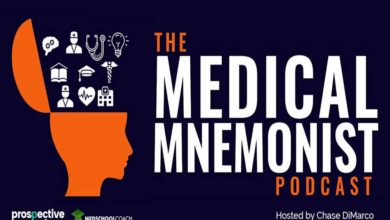Rhett Thomson discusses the importance of understanding material vs rote memorization, the story method, and pre-made versus self-made mnemonics.
- [00:43] Physeo’s Philosophy of Learning
- [05:29] PowerPoints Vs Physeo’s Content
- [12:05] Pre-Made and Self-Made Mnemonics
- [23:30] Questions to Ask When Studying or Learning
- [28:44] Rhett’s Thoughts on Step 1 Becoming Pass/Fail
- [32:10] Patterns of Learning Used By High-Scoring Step 1 Exam Participants
- [35:54] How to Find Out More About Physeo and Step 1 Success Stories
Chase DiMarco talks to Rhett Thompson, a student at the University of Utah Medical School and Cofounder of Physeo, a learning resource which helps medical students to prepare for the USMLE board exams. They discuss the importance of understanding versus only memorizing, the story method, and pre-made versus self-made mnemonics.
Physeo’s Philosophy of Learning
Physeo was born when Rhett and his friends were approaching their USMLE Step 1 Exam. They realized that they had relied on memorizing facts, without sufficiently understanding how these facts fit into deep and meaningful conceptual frameworks. The original intention was to build a conceptual framework around physiology, which is foundational to medicine. But at the moment, Physeo comprises not only 72 videos on physiology, but 79 videos in total covering other Step 1 topics as well.
PowerPoints have been the standard method of information dissemination, within medicine but also more broadly. There are several benefits to PowerPoints — they enable a student to follow along with a lecturer, and they enable notes to be accessible to students after the lecture, reducing anxiety around notetaking. However, PowerPoints are insufficient with regards to helping students to understand and lock in the information that they are given.
Physeo focuses on creating a large framework which makes learning and memorization intuitive and effortless. The core of Physeo’s philosophy is that understanding is key. Physeo’s videos walk students through complicated topics tested in the USMLE Step 1 Exam, reimagining them as stories, and using mnemonic devices which are logically coherent and intuitive, rather than a bunch of facts thrown together.
Pre-Made and Self-Made Medical Mnemonics
Medical students can use various pre-made mnemonics provided by companies like Physeo. However, some argue that self-made mnemonic devices are more effective than those created by someone else. While Rhett agrees that self-made medical mnemonics may stick better, it is difficult to create stories as complex, and yet intuitive as the pre-made ones created by Physeo if you do not have a team of people doing thorough research and refining the mnemonics together. Medicine involves many complex topics, and a mnemonic that is roughly thrown together by an individual person may not stick.
Questions to Ask When Learning
Although the quality and breadth of Physeo’s visual mnemonics are not achievable by an individual, Rhett provides key questions that students can ask in their own study time, as an effective learning technique. Firstly, ask why or how. To illustrate, in acute inflammation, prostaglandins can cause swelling. Instead of just memorizing this, ask yourself why/how prostaglandins cause swelling. You can then make a connection that is more logical. For example, prostaglandins cause postcapillary venules to become more permeable. This permeability can cause leaking of fluid, which results in edema in the interstitial tissue.
You have made a bit of a framework by making this logical connection — taking us to the next question: how does this fit into a bigger framework? Having studied prostaglandins, you might relate this to the larger framework of acute inflammation. So you have connected prostaglandins to swelling and acute inflammation.
Taking this further, in a clinical scenario, you might see someone with a swelling, sprained ankle. You know that swelling occurs in acute inflammation. You know that prostaglandins are released in acute inflammation, causing permeable postcapillary venules, and swelling. NSAIDs are prescribed to reduce the number of prostaglandins floating around, and in turn reduce swelling.
Explore Physeo as well as Rhett’s podcast Step 1 Success Stories.
Sign up for a Free Coaching session with Chase DiMarco, sponsored by Prospective Doctor! You can also join the Med Mnemonist Mastermind FB Group today and learn more about study methods, memory techniques, and MORE! Do check out Read This Before Medical School.
